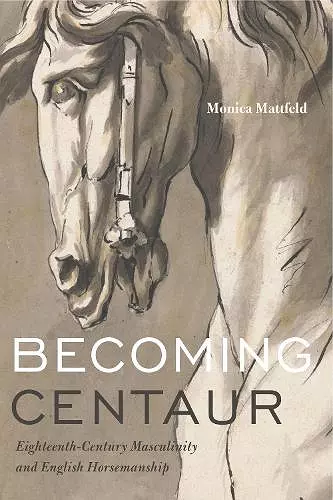Becoming Centaur
Eighteenth-Century Masculinity and English Horsemanship
Format:Hardback
Publisher:Pennsylvania State University Press
Published:30th Mar '17
Currently unavailable, and unfortunately no date known when it will be back
This hardback is available in another edition too:
- Paperback£33.95(9780271075785)

This study examines the historical relationship between men and horses, exploring how Becoming Centaur redefines masculinity through human-animal interactions.
In Becoming Centaur, Monica Mattfeld delves into the intricate history of horse-human relationships during the long eighteenth century, revealing how these connections influenced gender performances. The narrative examines the significant role horses played in the lives of their riders, as well as their presence in theatrical performances and early circus acts. This exploration highlights the politicization of human-animal interactions and the ways in which these relationships shaped societal norms and expectations.
Mattfeld's study focuses on men in seventeenth- and eighteenth-century England, emphasizing how horsemanship defined their gendered and political identities. The author illustrates how men transformed themselves through their relationships with horses, often embodying the mythical figure of the centaur—an image of power and awe. By analyzing manuals, memoirs, satires, and various cultural artifacts from the period, she reveals the evolution of horse husbandry practices in relation to the social and political landscape of the time.
Throughout Becoming Centaur, Mattfeld investigates the influence of prominent figures such as Thomas Hobbes and William Cavendish, as well as the impact of elite riding schools on social behavior. She also scrutinizes public perceptions of equestrian activities, from performances at Astley’s Amphitheatre to satirical depictions by Henry William Bunbury. Ultimately, the book presents a nuanced understanding of masculinity that acknowledges the significant role animals play in shaping human identity and societal constructs.
“Monica Mattfeld explores eighteenth-century English masculinity and gentlemanly honor from a scintillating new perspective—the horse’s back. Richly archival and theoretically alert, this splendid book illuminates the equestrian worlds of William Cavendish, London riding houses, the hunting field, Philip Astley’s celebrity circuses, and Henry Bunbury’s savage satires, revealing a hidden history of horses as secret sharers and historical agents in Englishmen’s self-imagining. A must for historians as well as animal studies scholars.”
—Donna Landry, author of Noble Brutes: How Eastern Horses Transformed English Culture
“This is the first detailed study of horsemanship and masculine identity across a long period, reinforcing our appreciation of the iconic status of horses through the eras. While Mattfeld draws on work done on the seventeenth century in particular, she takes the analysis forward into comparatively untouched territory. In doing so, she not only opens up the latter period but also charts the changes that occurred over time, resulting in a work of considerable value.”
—Peter Edwards, author of The Horse Trade of Tudor and Stuart England
“Monica Mattfeld’s brilliant and incisive book describes the embodied process of co-becoming that entangled men and horses in eighteenth-century culture. Blending posthumanist and materialist perspectives to illustrate how the horse-human partnership was crucial to the creation of diverse and competing versions of masculinity, Mattfeld offers a thoroughly historicized and original account of ‘centauric leviathans,’ equine theatrical actors, urban riding schools, and reactionary satirists, adding exciting new scholarship to a burgeoning field.”
—Karen Raber, author of Animal Bodies, Renaissance Culture
“Mattfeld’s book covers an interesting time period as well as imperative questions in relation to the social construction of masculinities. Moreover, she presents new knowledge of how the human–horse relationships are essential for the understanding of masculinity performance in the long eighteenth century.”
—Susanna Hedenborg idrottsforum.org: Nordic Sport Science Forum
“Becoming Centaur deftly blends cultural, political, and human-animal history. It is a masterful case study of how a particular social group—in this case elite horsemen—can shed light on broader cultural and political trends, both illustrating and complicating dominant narratives of change over time.”
—Ingrid H. Tague Journal of Modern History
ISBN: 9780271075778
Dimensions: 229mm x 152mm x 27mm
Weight: 567g
288 pages